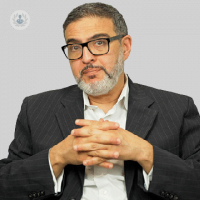How is lip repositioning performed?
Written by:Top Doctors recently spoke to highly experienced consultant plastic and reconstructive surgeon, Professor Ghassan Abu-Sittah. Here, the esteemed surgeon details what lip repositioning is, and what the potential associated side effects could be.

How important is one's smile?
A wonderful smile is a critical feature of beauty to which society gives a great importance. A smile is key to our socialisation and attraction. A person’s smile can express a sense of happiness, sensuality, success, affection and courtesy. It can also show confidence and kindness.
Unfortunately for the 15 to 20 per cent of young adults who have a gummy smile, it is a source of insecurity. The concept of a nice smile basically depends on the entity of three anatomic components: gum, teeth, and lips. A gummy smile, or a high lip line, is when the lip rests high on the gums when we smile and a disproportionate amount of gum tissue is shown leaving people self-conscious about smiling in public or in photographs.
What is lip repositioning, and how long does it take to perform?
The surgical lip repositioning procedure has been shown to produce long-term patient satisfaction with permanent results. It offers a permanent solution to the problem of a gummy smile. Many patients seek this surgery after having a series of Botox injection treatments that only last for a few months.
The procedure usually takes about 45 minutes to complete is performed under local anaesthetic. Two minor incisions are just below where the gums meet the upper lip and a small band of gum tissue is removed. A strip of the muscles that elevate the lip is excised so as to prevent the recurrence of the gummy smile. This adjusts the level the lip rises to when smiling or laughing. The lip is then sutured to achieve the final position.
What are the associated side effects?
The procedure is safe and has minimal side effects. There is minimal post-operative bruising, discomfort, and swelling.
What is recovery time like?
Recovery takes three to four days. During that time, there is typically moderate pain and swelling, which is manageable with over-the-counter pain medications. Patients typically can go back to work after four days, but will need to avoid strenuous exercise or activity for about two weeks.
After the first four weeks of healing, there will be some minor settling over the first six months in which the lip may rise about an additional millimeter when smiling. After six months, the results of lip repositioning surgery last permanently.
If you would like to correct your gummy smile today, make sure you book an appointment with consultant plastic and reconstructive surgeon, Professor Ghassan Abu-Sittah today by visiting his Top Doctors profile.


